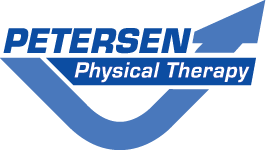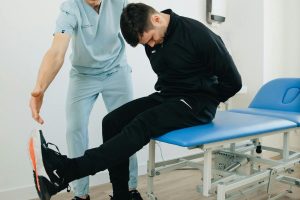When most people think of physical therapy, they often envision treatment for injuries, chronic pain, or post-surgical recovery. One of the fortunate side effects of physical therapy, however, is an improvement in mental health.
Physical therapy can positively influence mental health outcomes by reducing chronic pain, improving physical function, and enhancing overall well-being. Regular physical activity through therapy can also boost mood, alleviate symptoms of depression and anxiety, and promote a sense of empowerment and resilience.
Though it isn’t news to many in the fitness world, recent years have shown a growing recognition of the connection between physical wellness, mental health, and exercise.
Why we believe physical therapy has such an impact on a patient’s mental health
We’ve seen patients improve their mental health in tandem with their physical health many times over the years in our clinics. There are three main reasons why we believe this happens:
1. Reduction of pain provides emotional relief
We all know that physical therapy is designed to restore movement, improve function, and reduce pain. These effects are freeing for many patients, and often the result is the patient’s mental health improves along with their physical health.
Aside from the long-term empowerment that a holistic treatment like physical therapy provides, the short-term benefit of pain reduction is the feeling that one can move about their life without being held back by pain, injury, and dysfunction.
2. Patients leave physical therapy empowered
We’ve discussed many times on our site that the real goal of physical therapy is to empower patients to take their physical well-being into their own hands for the long haul.
While short-term solutions like medications can (and do) play a role when necessary, the endgame is for patients to be able to leave physical therapy with a clear plan of action. This plan of action involves a physical therapy home exercise program that they can keep up with for years to come.
The result of this is that patients leave physical therapy feeling empowered and in control of their situation, often a complete turnaround from the fear that their pain may linger for months or years, or that they may never get better.
3. Physical activity improves mental health on its own
In addition to the reasons mentioned above, we’d be remiss if we didn’t mention that regular physical exercise of any kind has a tendency to improve mental health outcomes on its own. Physical activity is a well-known mood booster because it helps release endorphins, the body’s natural “feel-good” chemicals.
Basic guided routines under the watchful eye of a professional can go a long way towards setting a patient up for success in continuing their journey and eventually transitioning into a regular exercise routine that will benefit their mental health for years to come.
Physical therapy is not a replacement for mental health treatment
It’s important to note that we don’t believe physical therapy can replace traditional therapy for those who need professional treatment for mental health issues. However, we have seen many times over the years that mental and physical health are linked.
For those dealing primarily with mental health issues, incorporating physical therapy into a broader treatment plan may help alleviate physical chronic pain contributing to their emotional struggles.
For those dealing primarily with physical injuries, incorporating mental health treatments into their treatment plan may help them navigate the challenges of their condition, especially if their condition has barred them from participating in activities that bring them joy.
Regardless, the primary issue should be treated with the appropriate therapeutic method. If you’re planning to engage in both treatments, seek out a good physical therapy clinic and be up-front with them during your initial evaluation for physical therapy.
Combining physical therapy with counseling or therapy
While technically any two treatment forms can be “combined” (i.e. utilized concurrently), the proposition of utilizing physical and emotional therapy together can be a great idea in certain situations.
Consider:
- A patient with a neurological condition like a stroke, who requires physical therapy to get better but also would benefit from counseling to manage the natural fear and depression that their condition
- A patient with chronic pain that has been linked to a mental health condition (remember that the definition of pain is a negative emotional experience resulting from actual or perceived tissue damage)
- A veteran undergoing therapy for post-traumatic stress disorder or a traumatic brain injury while also utilizing physical therapy to recovery from injuries incurred in their line of work
It wouldn’t be hard to imagine several more scenarios where utilizing the two treatments concurrently would result in a more positive outcome than using one or the other in isolation.
Physical therapy can complement psychological counseling or therapy with mental health professionals by addressing the physical symptoms that often accompany mental health disorders, such as fatigue, insomnia, or chronic pain. Together, these treatments can provide a more comprehensive approach to healing.
Benefits of adding physical therapy interventions for mental health
Here are some ways in which physical therapy can enhance mental well-being:
Reduction of depression and anxiety
As mentioned above, the release of endorphins can lead to a significant reduction in symptoms of common mental illnesses such as anxiety and depression. Through simply engaging in a program of activity, physical therapy can improve our quality of life by alleviating these two common mental health afflictions.
Moreover, physical therapy provides a sense of accomplishment and progress, which can be particularly beneficial for individuals struggling with mental health challenges.
Enhanced self-esteem and confidence
Chronic pain and physical limitations certainly take a toll on one’s self-esteem. Physical therapy empowers individuals by helping them regain control over their bodies.
As patients begin to see improvements in their physical capabilities, their confidence often grows, leading to a more positive self-image and improved mental health.
Stress relief and relaxation
The techniques used in physical therapy, such as massage, stretching, and breathing exercises, can significantly reduce stress. These practices help lower cortisol levels—the hormone associated with stress—and promote relaxation.
In turn, this can improve sleep quality, reduce tension, and foster a greater sense of calm and well-being.
Improved cognitive function
Regular physical activity has been shown to enhance cognitive function, including memory, attention, and problem-solving skills.
Physical therapy, by incorporating specific exercises that challenge coordination and balance, can stimulate brain function and contribute to sharper mental acuity.
Mental health and physical therapy
We always describe physical therapy as being “holistic.” If that’s the case, then we’ve got to consider the overall health of the patient in tandem with whatever physical issues we may be addressing.
Whether you’re dealing with chronic pain, recovering from an injury, or seeking to respond effectively to a mental health condition, physical therapy can be an effective adjunct to your progress.

















